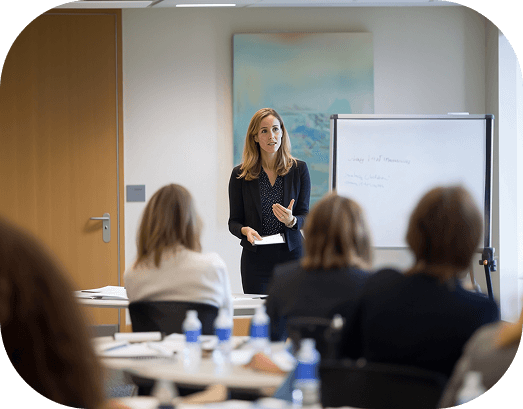Soft Skills and Mental Health Training for Corporate Clients
-
Development of Stress Resilience, Adaptability,
Personal Resourcefulness, Emotional Intelligence - Communication Skills, Conflict Resolution
- Planning, Goal Setting & Achievement
- Creation of Customised Training Programs Tailored to the Company's Needs, and More

I offer practical and engaging Soft Skills and Mental Health Training for corporate clients. Each training is a guarantee of psychological stability and literacy of your company’s employees, harmonious and environmentally friendly communication, as well as the ability to cope with stressful situations and maintain their own psychological resources, which in turn guarantees a well-coordinated workflow and high productivity of your company.
#1 “Resource is the energy of a quality life”
Training Goal
- determine your own level of resources;
- develop basic skills for creating and maintaining a resourceful state;
- learn to recognize the levels of your resource;
- apply 5 practical tools for restoring the resource state;
- increase resistance to stress and emotional burnout;
- strengthen and replenish your personal resource.
Participation in the training will provide an opportunity to
- acquire basic skills of creating, maintaining and optimally distributing personal resources;
- to analyze, realize and work with your personal resource in your future life;
- learn ways to adjust the state of their psychological resourcefulness and fullness;
- apply practices to restore the resource state.
Training content
- personal resource in human life - concept, types and importance;
- why is it important to study the topic of personal resource and be able to self-replenish?
- what does a high level of personal resource mean?
- the main components of the resource state;
- resource vs emotional burnout;
- ways to diagnose and prevent emotional burnout;
- stress vs resource;
- resilience - an important element of confronting life's difficulties;
- sources of personal resources of a person;
- conscious work on one's state of fullness and resourcefulness (diagnosis, analysis, restoration, filling, conservation, spending);
- creating your own case with individual personal resources for everyday use in life;
- search for sources of the most difficult and powerful personal resources;
- resource practices (art therapy, metaphorical maps).
Book a training – it’s the best investment you can make! Duration of trainings: 2.5 hours or two-day formats of 4 hours each.
For details and bookings, please contact via email.
#2 “Conflict Is Cool”*
(*If you know their secrets)
Training Goal
- teach your team how to resolve conflicts productively;
- explore the theoretical foundations of conflict psychology and its components;
- develop essential skills for preventing and resolving conflicts (management and transformation);
- learn to apply four different behavioral models in conflict situations;
- overcome the fear of conflict;
- build self-confidence when participating in conflict situations.
Participation in the training will provide an opportunity to
- understand the causes, types, and structure of conflict situations;
- learn to manage your own emotions and the emotions of others during conflict (becoming aware, regulating, directing, controlling, and transforming them);
- acquire key skills for preventing and resolving conflicts, including actions to stabilize the consequences of a conflict (introduction to restorative mediation);
- master techniques for constructive dialogue in conflict resolution;
- apply conflict management skills in everyday life.
Training content
- conflicts: definition, types, structure, causes, and their role in human life;
- conflict – negative or positive?
- participants in conflict situations, their characteristics, and methods of interaction;
- behavioral models in conflict situations;
- ways to develop skills for preventing and resolving conflicts;
- constructive dialogue vs. conflict;
- how conflicts affect the health of men and women;
- creating a personal action plan for dealing with conflicts (awareness, regulation, direction, prevention, control, and transformation) for everyday use;
- practices that help manage intense anxiety.
Book a training – it’s the best investment you can make! Duration of trainings: 2.5 hours or two-day formats of 4 hours each.
For details and bookings, please contact via email.
#3 “Highly Emotional Intelligence”
Training Goal
- to build an emotionally literate team in your company;
- to identify one’s own level of emotional intelligence;
- to learn how to recognize different emotions in oneself and others;
- to develop basic emotional literacy skills (controlling, managing, and transforming various emotions and emotional states);
- to apply 3 practical tools for emotional self-regulation;
- to increase resilience to stressful situations;
- to explore the impact of emotions on quality of life, relationships, health, and mental well-being.
Participation in the training will provide an opportunity to
- to learn how to work with your own emotions and the emotions of others in a way that ensures you manage emotions, rather than emotions managing you (to recognize, direct, regulate, prevent, manage, and transform them);
- to acquire key skills for identifying various emotions and emotional states in yourself and others;
- to master techniques for stabilizing heightened emotional reactivity when such states cause discomfort;
- to apply emotional management skills in everyday life.
Training content
- emotions and feelings — definitions, types, differences, and their importance in human life;
- emotional intelligence — the secret to success in the 21st century;
- why is it important to develop your emotional intelligence and know how to work with it?
- what are the benefits of a high level of emotional intelligence?
- key components of emotional intelligence;
- a test to assess your emotional intelligence level;
- methods for developing emotional intelligence;
- emotional intelligence VS stress;
- how emotions are connected to health;
- will emotional intelligence kill marketing?
- analysis of your emotional states;
- creating a personal toolkit for working with your emotions (awareness, management, and transformation) for everyday use.
Book a training – it’s the best investment you can make! Duration of trainings: 2.5 hours or two-day formats of 4 hours each.
For details and bookings, please contact via email.
#4 “Anti-Stress”
Training Goal
- to help each employee in your company create their own personal stress prevention/work strategy;
- to analyze and assess stress resilience skills;
- to explore the theoretical aspects of stress psychology and its components;
- to learn how to recognize stress factors and prevent stressful situations;
- to develop basic stress resilience skills;
- to apply techniques for stabilizing emotional states during stressful situations and transforming the effects of stress;
- to learn how to recover after experiencing stress.
Participation in the training will provide an opportunity to
- get acquainted with all the elements of stressful situations and their components, thus learning that "the wolf (stress) is not as scary as it's painted";
- learn how to manage stress in your life, prevent it, and transform its consequences;
- practice and consolidate techniques that increase stress resilience and help cope with its negative effects.
Training content
- stress - the concept, types, causes, structure, and elements;
- the role of stress in modern life – always nearby, is it beneficial or harmful?;
- the mechanism of stress initiation and development (physiology, psyche);
- ways of interacting with stress - the goal is to neutralize it - mission possible;
- who is more prone to stress?;
- stress prevention - the best way to fight it;
- ways to develop stress resilience skills and transform its negative effects;
- creating your own stress resilience case for everyday use in life (formula, management, control, transformation);
- interesting and exciting practices for developing and improving stress resilience skills.
Book a training – it’s the best investment you can make! Duration of trainings: 2.5 hours or two-day formats of 4 hours each.
For details and bookings, please contact via email.
#5 “Fundamentals of Effective Communication”
Training Goal
- to create healthy and ecological communication among the employees of your company;
- to analyze and assess communication skills, identify weak points;
- to familiarize with the theoretical part of the psychology of effective communication;
- to develop basic skills for successful introductions, maintaining harmonious communication, and creating an atmosphere that encourages continued communication;
- to be able to make an impression and speak in a way that not only gets heard but also listened to and understood;
- to boost self-confidence during communication.
Participation in the training will provide an opportunity to
- familiarize with all elements of successful and effective communication;
- learn how to maintain ecological and friendly communication, both in business and personal contexts;
- practice and consolidate effective communication techniques through various tasks during the training.
Training content
- communication - concept, types, structure, and its significance in human life;
- the formula for successful communication;
- participants in communication, their characteristics, ways of interaction, and presenting information;
- what must a speaker be like for them to be heard, listened to, understood, and given feedback;
- how do different people perceive information?;
- when you speak, who are you speaking to? (analysis of the listener's portrait, interlocutor);
- ways to develop effective and successful communication skills;
- active listening as a way to better understand each other;
- creating your own case of successful communication for everyday use in life (formula, management, support, atmosphere);
- interesting and engaging practices for developing and improving communication skills.
Book a training – it’s the best investment you can make! Duration of trainings: 2.5 hours or two-day formats of 4 hours each.
For details and bookings, please contact via email.
Each training is a guarantee of psychological stability and literacy of your company’s employees, harmonious and environmentally friendly communication, as well as the ability to cope with stressful situations and maintain their own psychological resources, which in turn guarantees a well-coordinated workflow and high productivity of your company.
Book a training – it’s the best investment you can make!
For details and bookings, please contact via email.
Ready to Change
Your Life?
Book a consultation today and together we will start transforming your life for the better.
Training Feedback

Victoria, thank you for the engaging and insightful masterclass on emotional intelligence! Understanding oneself is so important. Yesterday's session made it clear that, intuitively, I'm moving in the right direction. Special thanks for the EQ test - there's definitely room for growth!

Victoria, the topic of resources is very relevant to me. Thank you for the practical exercises - it was valuable to look at myself from a fresh perspective!
I'm glad we met!
A fresh perspective!
I'm glad we met!

Grateful to Victoria for her positive energy that shines through even the computer screen! The advice, recommendations, and practices she shares are truly valuable - they uplift and inspire in everyday life. Thank you for the inspiration!

The wonderful and smiling Victoria presents valuable information in a fun and engaging way.
Her sessions radiate positivity, all-encompassing love, kindness, and warmth.
all-encompassing love, kindness, and warmth.
*Comments are published with the consent of training participants; names and photos have been changed to protect confidentiality.
Frequently
Asked
Questions
1) Low self-esteem, lack of self-confidence
2) Lack of self-love and self-acceptance
3) Lack of satisfaction with life
4) Loneliness, grief, various fears
5) Depression, loss of life meaning, search for purpose
6) Old emotional wounds that prevent living fully
7) Feelings of guilt
8) Psychological trauma
9) OCD, PTSD, GAD, and eating disorders
10) Family crises (divorce, breakup, infidelity, etc.)
11) Leaving toxic relationships
12) Conflicts with children
13) Difficulties with integration and adaptation in a new country
14) Various ongoing life conflicts and personal crises, etc.
Everyone’s situation is individual, but there are some common signs that it might be time to go to a psychologist or psychotherapist:
A life problem significantly reduces your quality of life, the situation is getting worse, and you can’t cope on your own
A feeling of hopelessness and the belief that nothing can change
A depressed mental state lasting more than a month
Unresolved psychological trauma (including childhood trauma) that prevents you from living a full life
A prolonged state of emotional burnout or apathy
A need to be heard and understood
A psychologist helps to resolve current life difficulties, usually through short-term work (10–15 sessions).
A psychotherapist works with the whole personality, provides long-term therapy (15 or more sessions), and helps to change destructive life patterns and improve overall quality of life.
A psychiatrist is a medical doctor who can diagnose mental disorders and prescribe medication.
According to research (e.g., Bruce Wempold’s model), the following factors influence success in therapy:
| Factor | Impact on Therapy Success |
|---|---|
| Quality of the therapist–client relationship (therapeutic alliance, trust, support) | 30% |
| Client factors (motivation, personal resources, external circumstances) | 40% |
| Therapeutic methods and techniques (e.g., CBT, psychoanalysis, Gestalt) | 15% |
| Client expectations / placebo effect (belief in help, hope) | 15% |
For an online session, a quiet, private space with a stable internet connection and good sound quality is required.
Booking is only possible after 100% prepayment. To cancel or reschedule a session, you must inform us at least 48 hours before the scheduled time. Otherwise, the prepayment is non-refundable.
The client has the right to confidentiality, professional assistance, the ability to regulate the depth of openness, and the freedom to choose the methods of work.
The client is responsible for adhering to the terms of the consultation, making timely payments, and providing truthful information that may affect the outcome of the work.
All consultations are conducted under full confidentiality, except in cases where the information:
Contains signs of a criminal offense as defined by law
Poses a danger to the life and/or health of the client or others.
Consultations with a client who is under the influence of alcohol, drugs, or any other intoxicating substances are not permitted.
Everything is individual, but for the best results, it is recommended to have consultations once a week.
